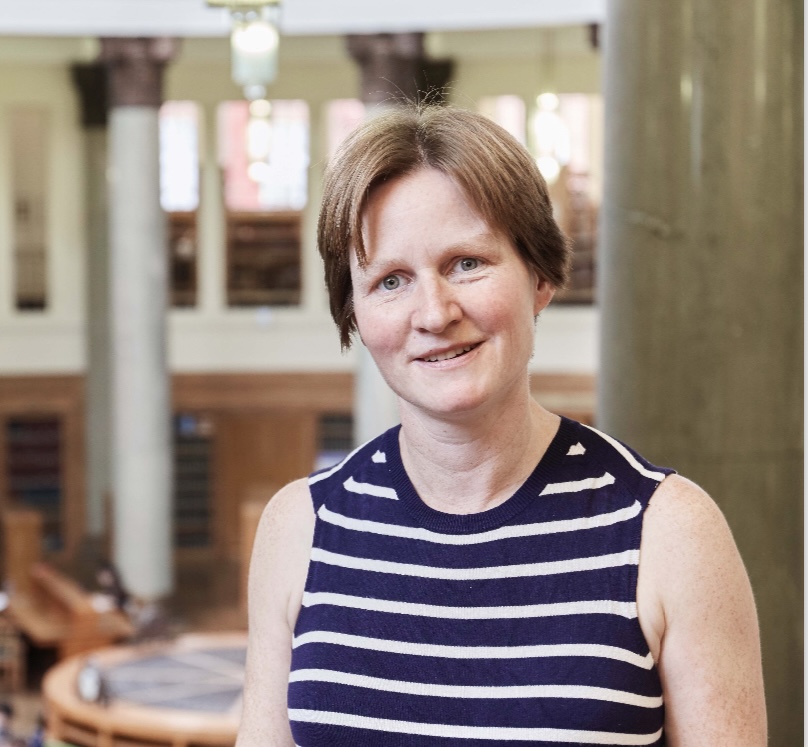Researcher of the Month, December 2024: Alison Searle

Dr Alison Searle is Associate Professor of Textual Studies in the School of English at the University of Leeds. Alison is a member of the CRPL community and last year co-presented at the CRPL seminar together with Dr. Jo Sadgrove.
Tell us a little about your research journey – how did you get to where you are right now?
While doing my BA in English and History at the University of Sydney, I spent an exchange semester at the University of Glasgow, which had a strong research focus on the intersection between literature and religion. This sparked an interest which shaped my fourth-year Undergraduate dissertation on 19th C American novelist Harriet Beecher Stowe’s The Minister’s Wooing (1859) and the 17th C English Puritan Richard Baxter’s biography of his wife, A Breviate of the Life of Mrs Margaret Baxter (1681). My PhD research, also at the University of Sydney, explored scriptural approaches to the imagination in dialogue with literature and was published as ‘The Eyes of Your Heart’: Literary and Theological Trajectories of Imagining Biblically (Paternoster, 2008). I held a series of postdoctoral positions at Queen Mary, University of London, Anglia Ruskin University, Cambridge, and the University of Sydney, before joining the University of Leeds in September 2016. These postdoctoral roles included developing expertise in textual studies, scholarly editing, and an expanding interest in how theology and literature shaped one another, primarily within early modern nonconformist and dissenting strands of Protestantism across the British Atlantic. My most recent publications include Pastoral Care through Letters Across the British Atlantic (Cambridge, 2023), and a co-edited collection, The Puritan Literary Tradition (Oxford, 2024).
What are you currently, or about to start, working on?
I am currently involved in two large-scale collaborative research projects. The first is a nine-volume edition of The Complete Correspondence of Richard Baxter (contracted to Oxford University Press) and of which I am one of two general editors. Baxter (1615-91) was an insatiably curious, self-taught intellectual, and one of the most prolific writers in 17th C Britain (over 130 published books, and a substantive archive of manuscript material). He wrote to a wide range of correspondents including apprentices, gentlewomen, natural philosophers, the Lord Protector, bishops, and three generations of Mathers in New England, and his correspondence offers an extraordinary insight into the religious, political, cultural, and spiritual concerns of individuals across the ecclesial spectrum in 17th C Britain, Europe, and North America.
The second strand of research work emerges from a collaborative AHRC-funded project on pastoral care with Dr Jo Sadgrove (United Society Partners in the Gospel (USPG)) which ran from 2020-21 and has initiated a wide-ranging interrogation of the legacies of enslavement in relation to archives, ethics, religious repositories, and a transhistorical communion of saints. One particular co-produced, open-access output that exemplifies some of this work in its early stages is the online exhibition hosted by the Bodleian Library: ‘The Society for the Propagation of the Gospel: A Transatlantic Community of Letters’. This research is currently expanding through a specific focus on colonial Anglicanism in North America and the Caribbean, in dialogue with USPG, Lambeth Palace Library, and Fulham Palace Trust, engaging questions of risk, belonging, storytelling, epistemicide, power, access, inclusion, and imagination when examining the curation and interpretation of archival material that is entangled in colonial legacies of mission, exploitation, and extraction.
In what way(s) do you feel your research examines the role of religion in public life and the relationship between the two?
My research has focused on the complex intersections and reciprocal exchanges between literature, theology, imagination, and performance for twenty years. However, it is only in the last five years that I have begun to conceptualise my work as an examination of the role of religion in public life. Undertaking a collaborative, cross-sectoral research project on pastoral care that traced connections between the past (early 18th C) and present (February 2020) catalysed my thinking and engagement with transtemporal ways of approaching community, imagination, belonging, and textual archives in ways that I could never have envisaged previously. Research on the Society for the Propagation of the Gospel (SPG)’s correspondence archive had to be reframed in dialogue with the re-emergence of Black Lives Matter (Edward Colston was an early member of the SPG, and his statue was toppled in Bristol in the second month of my collaborative work with (U)SPG, March 2020), and Covid-19, which brought an historical interrogation of pastoral care through literary cure into sharp relief as almost all caregiving shifted to remote forms of communication mediated via technology. This has led me to reflect on how my own research expertise and interests can contribute in meaningful ways to facilitate and inform wider public conversations about the relationships between early modern archives, ethics, and questions of access. There is a need to sit within the ruins of the white imperial colonial project, inextricably entangled with the Church of England and its mission agencies, and negotiate the discomfort, dissonance, and pain; the gaps, silences, and potentially irreparable harms. Interpretation is a shared endeavour, and I am working to explore the specific affordances offered by the religious heritage sector in partnership with faith communities to co-create new forms of storytelling, individual and communal, giving concrete shape to reparative imaginaries, taking repentance, lament, and redemption seriously. Offering a better model of contestation based on evidence replaces the impoverished binaries currently constructed within public discourse, characterised by self-aggrandising and -exculpating apologies, and virtue-signalling cancel culture. My research, in dialogue with many others, asks: what does it mean to do the work of repair in collaboration with humility? How can the theological virtue of hope enrich public imaginaries to create space for grace, transformation, and healing?
